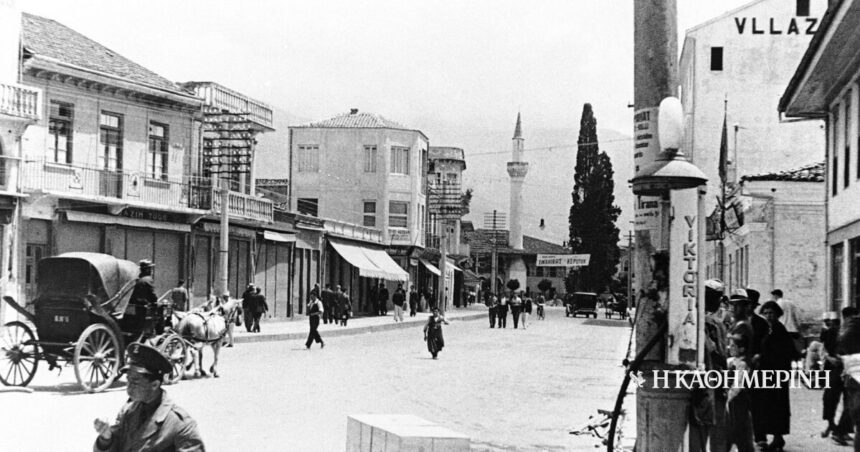Its formation Balkan Alliance between Serbia, Bulgaria, Greece and Montenegro in 1912, was the result of the interaction of many factors. The main ones were the policy of Turkification practiced by the Young Turks on the non-Muslim populations, the removal of the reservations of British about the eventual dissolution of the Ottoman Empire after 1907, when the British-Russian rapprochement was achieved, the defeat of the Ottomans in the Italo-Ottoman War of 1911-1912, the return of of Russia in Balkan affairs after its failed involvement in the Far East and the uprisings of Albanians during 1910 and 1911.
Albanian nationalism initially developed as a reaction of Albanians to the territorial shrinking of the Ottoman Empire against the dominant Balkan states during the 19th century. The first political manifestation of Albanian nationalism took place in 1878when the Prizren League was founded, amid the rapid developments of the Eastern Crisis. However, her imprint on developments was negligible. Until the Congress of Berlin (July 1878), there had been no Albanian spiritual renaissance and the Albanian national movement was not distinguished for its cohesion. In short, European diplomacy and public opinion did not know about the Albanians. After all, the phrase attributed to the “iron chancellor” of Germany, Otto von Bismarck, who declared during the Berlin Conference that “there is no Albanian nation” is well known.
Albanians expected the decentralization of the Ottoman Empire, hoping for the establishment of an Albanian state.
The Young Turk Revolution (1908) gave a new impetus to the Albanian national movement. Albanian officers joined the movement anticipating the decentralization of the Ottoman Empire. In the long term they hoped for the establishment of an Albanian state. In the elections of December 1908, 26 Albanian deputies were elected to the Ottoman Parliament. Among the Albanian politicians of this period, Ismail Kemal Vlora stood out. He was a scion of the wealthy Vlora family from Avlona, who, after studying at the Zosimaia School of Ioannina, made his career in the administrative machinery of the Ottoman Empire.
After the refusal of the Young Turks to satisfy the demands of the Albanians, for the establishment of Albanian schools and tax reductionsthe latter revolted (1910-1911). They then submitted to the High Gate a list of their demands, which related to the administrative decentralization of the vilayets claimed by them (Ioannina, Kosovo, Shkodra and Monastirius). In August 1912 there was a new rebellion and a long discussion followed between their leaders and the Gate to reach a compromise. The threats of the Albanians to occupy Thessaloniki accelerated the declaration of the First Balkan War by the Balkan Alliance.
The threats of the Albanians to occupy Thessaloniki accelerated the declaration of the First Balkan War.
During the First Balkan War, the Albanians fought on the side of the Ottomans. The crushing defeat of the Ottoman forces dashed all hope of the Porte granting privileges to the Albanians in the administrative regions claimed by them. In November 1912, Albanian fugitives under Ismail Kemal, who had fled abroad after his conflict with the Young Turks, converged on Bucharest and decided to convene a National Assembly to declare the independence of an Albanian state. Ismail Kemal then went to Vienna where, after meeting with the foreign minister, Count Berchtold, he secured Austrian diplomatic support for his plans.
Ismail Kemal arrived in Avlona via Trieste. On November 28, 1912, the Albanian National Assembly, which consisted of 37 representatives, proclaimed the independence of Albania and then a government was formed under Ismail Kemal. He took care to inform the governments of the Great Powers as well as the Balkan states about the recent developments. However, he only controlled the area around Avlona. On the same day that the Albanians declared their independence, the Serbs entered Durres, while the Montenegrins besieged Shkodra and the Greeks besieged Ioannina. During the First Balkan War, the Greek army liberated Argyrokastro, Koritsa and other towns and villages of Northern Epirus. Ultimately, the question of establishing an Albanian state was left to be settled by the Great Powers.
Column editor: Myrto Katsigera, Vassilis Minakakis, Antigoni-Despina Poimenidou, Athanasios Syroplakis




